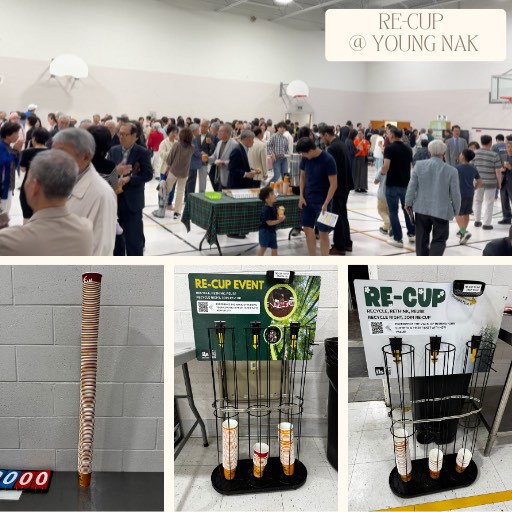Background
Innovative Landfill Solutions Canada (ILS Canada) has extended its RE-CUP program to Toronto’s YoungNak Church as part of its ongoing research into improving the recycling efficiency of single-use cups. This initiative aligns with the City of Toronto’s new policy classifying single-use cups as recyclable materials, supported by a pilot program encouraging households to collect these items for recycling.
Recognizing the limitations of targeting households where single-use cups are less frequently consumed, ILS Canada has prioritized locations like schools, community facilities, and commercial areas to maximize collection efficiency and environmental impact. This research-based approach aims to evaluate and refine recycling strategies to ensure the successful implementation of the RE-CUP program.
Why YoungNak Church?
YoungNak Church, with over 3,000 registered members, is one of Toronto’s largest Korean community churches. In addition to its Korean congregation, the church also serves as a community hub for smaller ethnic groups, who use the building for their own worship services. This diverse and active environment made it an ideal location to pilot the RE-CUP program.
The program was implemented in the church’s gymnasium, which serves as a fellowship area on Sundays. During three main fellowship periods (9:00–9:30 AM, 11:00–11:40 AM, and 1:00–1:40 PM), the space accommodates members who gather around eight widely spaced tables to enjoy bread, coffee, and tea after worship services.
Study Goals and Installation
Two RE-CUP Sorters were installed in the gym without any prior announcements or promotional materials. The goal was to observe organic behaviors and collect valuable data regarding:
- Whether individuals would correctly dispose of cups into the RE-CUP Sorters without guidance.
- How much attention the RE-CUP Sorters would attract.
- Changes in awareness and behavior over time, leading to increased cup collection.
- The percentage of total cup waste collected in the sorters compared to traditional trash bins.
- Behavioral shifts as participants adapted to using the RE-CUP Sorters instead of regular trash bins.
Additionally, the research aimed to monitor other factors, such as contamination levels, cleanliness of the collected cups, and the potential for long-term behavior change.
Initial Results
On January 19, 2025, the first day of the program, two RE-CUP Sorters were operational during four fellowship periods between 9:00 AM and 2:00 PM. Key findings included:
- A total of 135 cups were collected without any promotional efforts, solely through the presence of the sorters next to existing trash bins.
- The placement of the sorters near restrooms and trash bins prevented contamination with non-cup waste.
- No leftover beverages spilled into the sorters, ensuring cleanliness and proper collection.
- Cups were collected in a clean and organized manner, meeting the program’s design objectives.
Future Plans
ILS Canada plans to operate the RE-CUP Sorters at YoungNak Church for a period of 1–3 months to evaluate long-term changes in participant behavior and awareness. The study will focus on:
- Measuring the impact of increased familiarity with the RE-CUP Sorters.
- Determining the scalability of the program to other community spaces.
- Identifying strategies to maximize participation and ensure sustainable recycling habits.
Through this research, ILS Canada aims to develop a meaningful, scalable program that can transform single-use cups into valuable recyclable resources, driving a significant environmental impact.

No responses yet